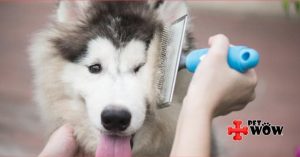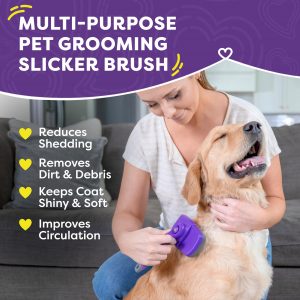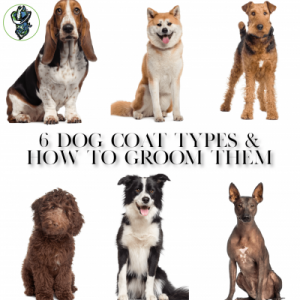Fur, fur everywhere! Summer is here, and you may notice your dog shedding out their winter coat. While you may decide it’s time to pull out the grooming brush, your fur baby can reap the benefits of regular brushing all year around!
One of our wonderful volunteers, Lea Thompson, who is also a retired groomer, gives us tips and tricks for keeping your dog’s coat looking fabulous and healthy. She shares her expert advice for everyone looking to improve their dog’s coat.

Brushing your dog has a variety of perks that make it a valuable and enjoyable activity for both you and your dog.

Getting Started
To begin, smaller dogs can be situated on a sturdy table or non-slip surface where they can be safely . Please note, for safety it’s important to never leave a dog unattended when on a table. You also want to ensure that your dog is not restrained in such a way that could pose a hazard if he tries to jump off. For larger dogs, find a quiet place on the ground without distractions to leash them. Ideally you’ll still want larger dogs on a non-slip surface, so keep that in mind when choosing your setup.
Using a considerate approach, slowly allow your dog to sniff the brush first and reward with a treat. You will want to use a slicker brush and/or a comb to address specific areas of your dog. If your animal has short hair, a curry brush will be helpful, while a detangling comb is best for double-coated breeds or dogs with longer hair.
Start slowly getting your dog used to the sensation of the brush. Keep your hands on the dog continuously to reduce any touch sensitivities and increase the comfort level for your dog. Begin by brushing his/her topline, from the back of the head to the base of the tail. Follow by brushing down the flanks, shoulders, chest and rump. Always brush in the direction of the hair, and never against it.
Use a wide-toothed comb to address problem areas. Comb the bottom of the area first, and then move your comb upwards in small sections to avoid tugging or pulling the hair. You may need to return to the area with your slicker brush. Once an area is untangled and the comb will pass through the hair freely, move onto the next area. Throughout the process, you’ll want to continue to reward your dog with treats.
Focus on areas with thicker hair such as the back, rump, thighs, neck/collar area. Don’t forget to brush behind the ears and armpits. Brush and comb your whole dog, not just his back and hips.


Helpful tips
Brushing should be a regular part of your dog’s health care routine. New puppies should be gently introduced to brushing early in life to make positive associations with it.
“Give your pup breaks,” says Lea. “This is important for puppies, energetic dogs, and animals new to brushing. Ending each session on a positive note creates a good experience for next time.”
If your dog is stressed or unhappy while being groomed, take a break and try again a different time at a slower pace, with extra positive reinforcement. Some dogs take time to get used to being groomed so always take it in steps to avoid any negative associations.
When to seek Professional Help
If your dog continues to have high fear, anxiety and/or stress surrounding grooming or if your dog has special skin or coat needs, consider speaking with a professional groomer or your veterinarian. Professional groomers have additional knowledge and skills to help keep dogs calm and comfortable during the grooming experience.